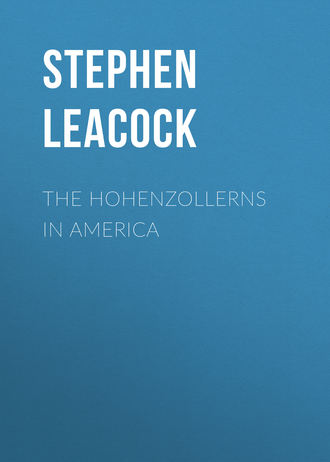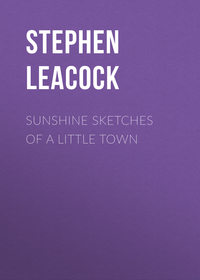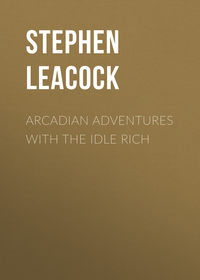 полная версия
полная версияThe Hohenzollerns in America
The just complaint of Mr. Silas Heck, farmer, as interviewed by me, incognito, at the counter of the Gold Dollar Saloon.
"Yes, sir, I say the Government's in the wrong, and I don't care who hears me. (Say, is that feller in the slick overcoat listening? Let's move along a little further.) They're right to carry on the war for all the nation is worth. That's sound and I'm with 'em. But they ought not to take the farmer offen his farm. There I'm agin them. The farmer is the one man necessary for the country. They say they want bacon for the Allies. Well, the way I look at it is, if you want bacon, you need hogs. And if there are no men left in the country like me, what'll you do for hogs!
"Thanks, was you paying for that? I guess we won't have another, eh? Two of them things might be bad for a feller."
So, when I used to listen to the complaints of this sort that rose on every side, I was glad that I was not President of the United States.
At the same time I DO think that the Government makes a mistake in taxing the profits of the poor book writers under the absurd name of INCOME. But let that go. The Kaiser would probably treat us worse.
I.—Some Startling Side Effects of the War
"There is no doubt," said Mr. Taft recently, "that the war is destined to effect the most profound uplift and changes, not only in our political outlook, but upon our culture, our thought and, most of all, upon our literature."
I am not absolutely certain that Mr. Taft really said this. He may not have said "uplift." But I seem to have heard something about uplift, somewhere. At any rate, there is no doubt of the fact that our literature has moved—up or down. Yes, the war is not only destined to affect our literature, but it has already done so. The change in outlook, in literary style, in mode of expression, even in the words themselves is already here.
Anybody can see it for himself by turning over the pages of our fashionable novels or by looking at the columns of our great American and English newspapers and periodicals.
But stop,—let me show what I mean by examples. I have them here in front of me. Take, for example, the London Spectator. Everybody recognised in it a model of literary dignity and decorum. Even those who read it least, admitted this most willingly; in fact, perhaps all the more so. In its pages to-day one finds an equal dignity of thought, yet, somehow, the wording seems to have undergone an alteration. One cannot say just where the change comes in. It is what the French call a je ne sais quoi, a something insaisissable, a sort of nuance, not amounting of course to a lueur, but still,—how shall one put it,—SOMETHING.
The example that is given below was taken almost word for word (indeed some of the words actually were so) from the very latest copy of The Spectator.
EDITORIAL FROM THE LONDON "SPECTATOR"
Showing the Stimulating Effect of the War on Its Literary Style
"There is no doubt that our boys, and the Americans, are going some on the western front. We have no hesitation in saying that last week's scrap was a cinch for the boys. It is credibly reported by our correspondent at The Hague that the German Emperor, the Crown Prince and a number of other guys were eye witnesses of the fight. If so, they got the surprise of their young lives. While we should not wish to show anything less than the chivalrous consideration for a beaten enemy which has been a tradition of our nation, we feel it is but just to say that for once the dirty pups got what was coming to them. We are glad to learn from official quarters that His Majesty King George has been graciously pleased to telegraph to General Pershing, 'Soak it to 'em—and THEN some.'
"Meantime the situation from the point of view both of terrain and of tactics remains altogether in our favour. The deep salient driven into the German lines near Soissons threatens to break up their communications and force a withdrawal on a wide front. We cannot make the position clearer to our English readers than by saying that our new lines occupy, as it were, the form of a baseball diamond, with Soissons at second base and with our headquarters at the home plate and our artillery support at third. Our readers will at once grasp the fact that, with our advance pivoted on the pitcher's box and with adequate cover at short, the thing is a lead-pipe cinch, —in fact, we have them lashed to the mast.
"Meantime the mood of the hour should be one, not of undue confidence or boastfulness, but of quiet resolution and deep thankfulness. As the Archbishop of Canterbury so feelingly put it in his sermon in Westminster Abbey last Sunday, 'Now that we have them by the neck let us go on, in deep and steadfast purpose, till we have twisted the gizzard out of them.'
"The Archbishop's noble words should, and will, re-echo in every English home."
Critical people may be inclined to doubt the propriety, or even the propinquity, of some of the literary changes due to the war. But there can be no doubt of the excellent effect of one of them, namely, the increasing knowledge and use among us of the pleasant language of France. It is no exaggeration to say that, before the war, few people in the United States, even among the colored population, spoke French with ease. In fact, in some cases the discomfort was so obvious as to be almost painful. This is now entirely altered. Thanks to our military guide-books, and to the general feeling of the day, our citizens are setting themselves to acquire the language of our gallant ally. And the signs are that they will do it. One hears every day in metropolitan society such remarks as, "Have you read, 'Soo le foo?'" "Oh, you mean that book by Haingri Barbooze? No, I have not read it yet, but I have read 'Mong Swassant Quinz' you know, by that other man."
This is hopeful indeed. Nor need we wonder that our best magazines are reflecting the same tendency.
Here for instance are the opening sentences of a very typical serial now running in one of our best periodicals: for all I know the rest of the sentences may be like them. At any rate, any magazine reader will recognize them at once:
BONNE MERE PITOU
A Conte of Old Normandy
Bonne Mere Pitou sat spinning beside the porte of the humble chaumiere in which she dwelt. From time to time her eyes looked up and down the gran' route that passed her door.
"Il ne vient pas," she murmured (he does not come).
She rose wearily and went dedans. Presently she came out again, dehors. "Il ne vient toujours pas," she sighed (he still does not come).
About her in the tall trees of the allee the percherons twittered while the soft roucoulement of the bees murmured drowsily in the tall calice of the chou-fleur.
"Il n'est pas venu," she said (perfect tense, third singular, he is not, or has not, come).
Can we blame him if he didn't? No doubt he was still studying his active verb before tackling Mere Pitou.
But there! Let it pass. In any case it is not only the magazines, but the novels themselves, that are being transformed by the war. Witness this:
BY ONE OF OUR MOST POPULAR NOVELISTS
"It was in the summer house, at the foot of the old garden, that the awaited declaration came. Edwin kneeled at Angelina's feet. At last they were alone! The successful barrage of conversation which he had put up at breakfast had compelled her mother to remain in her trenches, and had driven her father to the shelter of his dug-out. Her younger brother he had camouflaged with the present of a new fishing rod, thus inducing him to retire to the river. The communications with the servants had been cut. Of the strict neutrality of the gardener he was already assured. Edwin felt that the moment had come for going over the top. Yet being an able strategist, he was anxious not to attempt to advance on too wide a front.
"Angelina!" he exclaimed, raising himself to one knee with his hands outstretched toward her. The girl started as at the sound of an air bomb; for a moment she elevated her eyes and looked him full in the tangent, then she lowered them again but continued to observe him through her mental periscope.
"Angelina," he repeated, "I have a declaration to make."
"As from what date?" she questioned quietly. Edwin drew his watch from his pocket.
"As from this morning, at ten-forty-six," he said. Then, emboldened by her passive attitude, he continued with rising passion in his tone.
"Ever since I first met you I have felt that I could not live without you. I am a changed man. My calibre is altered. I feel ten centimeters wider in the mouth than I did six weeks ago. I feel that my path is altered. I have a new range and an angle of elevation such as I never experienced before. I have hidden my love as best I could till now. I have worn a moral gas-mask before your family. I can do so no longer. Angelina, will you be mine, forming with me a single unit, drawing our rations from the same field kitchen and occupying the same divisional headquarters?"
The girl seemed to hesitate. She raised her eyes to his.
"We know one another so little," she murmured.
Edwin felt that his offensive was failing. He therefore hastened to bring up his means of support.
"I have an ample income of my own," he pleaded.
Angelina raised her eyes again. It was evident that she was about to surrender. But at this moment her mother's voice was heard calling, "Angelina, Angelina, my dear, where are you?"
The barrage had broken down.
"Quick," said the girl, "mobilize yourself. Pick up that tennis racket and let us hurry to the court and dig ourselves in."
"But my declaration," urged Edwin eagerly.
"Accepted," she said, "as from eleven-two this morning."
V.—Other Impossibilities
1.—The Art of Conversation
I—HOW TO INTRODUCE TWO PEOPLE TO ONE ANOTHER
Nothing is more important in introducing two people to each other than to employ a fitting form of words. The more usually recognized forms are easily learned and committed to memory and may be utilized as occasion requires. I pass over such rudimentary formulas as "Ed, shake hands with Jim Taylor," or, "Boys, this is Pete, the new hand; Pete, get hold of the end of that cant-hook." In fact, we are speaking only of polite society as graced by the fair sex, the only kind that we need care about.
The Third Avenue Procedure
A very neat and convenient form is that in vogue in Third Avenue circles, New York, as, for instance, at a fifty-cents-a-head dance (ladies free) in the hall of the Royal Knights of Benevolence.
"Miss Summerside, meet Mr. O'Hara," after which Miss Summerside says very distinctly, "Mr. O'Hara," and Mr. O'Hara says with equal clearness "Miss Summerside." In this circle a mark of exquisite breeding is found in the request to have the name repeated. "I don't quite catch the name!" says Mr. O'Hara critically; then he catches it and repeats it—"Miss Summerside."
"Catching the name" is a necessary part of this social encounter. If not caught the first time it must be put over again. The peculiar merit of this introduction is that it lets Miss Summerside understand clearly that Mr. O'Hara never heard of her before. That helps to keep her in her place.
In superior circles, however, introduction becomes more elaborate, more flattering, more unctuous. It reaches its acme in what everyone recognizes at once as
The Clerical Method
This is what would be instinctively used in Anglican circles—as, for example, by the Episcopal Bishop of Boof in introducing a Canon of the Church to one of the "lady workers" of the congregation (meaning a lady too rich to work) who is expected to endow a crib in the Diocesan Home for Episcopal Cripples. A certain quantity of soul has to be infused into this introduction. Anybody who has ever heard it can fill in the proper accentuation, which must be very rich and deep.
"Oh, Mrs. Putitover, MAY I introduce my very dear old friend, Canon Cutitout? The Canon, Mrs. Putitover, is one of my DEAREST friends. Mrs. Putitover, my dear Canon, is quite one of our most enthusiastic workers."
After which outburst of soul the Bishop is able to add,
"Will you excuse me, I'm afraid I simply MUST run."
Personally, I have never known or met a Bishop in society in any other situation than just about to run. Where they run to, I do not know. But I think I understand what they run from.
The Lounge Room of the Club
Equally high in the social scale but done quite differently is the Club Introduction. It is done by a club man who, for the life of him, can't remember the names of either of the two club men whom he is introducing, and who each, for the life of him, can't think of the name of the man they are being introduced by. It runs—
"Oh, I say, I beg your pardon—I thought, of course, you two fellows knew one another perfectly well—let me introduce—urr–wurr–"
Later on, after three whiskey-and-sodas, each of the three finds out the names of the other two, surreptitiously from the hall porter. But it makes no difference. They forget them again anyway. Now let us move up higher, in fact, very high. Let us approach the real thing.
Introduction to H.E. the Viceroy of India, K.C.B.,
K.C.S.I., S.O.S.
The most exalted form of introduction is seen in the presentation of Mr. Tomkins, American tourist, to H.E. the Viceroy of India. An aide-de-camp in uniform at the foot of a grand staircase shouts, "Mr. Tomkins!" An aide-de-camp at the top (one minute later) calls "Mr. Thompson"; another aide, four feet further on, calls "Mr. Torps."
Then a military secretary, standing close to His Excellency, takes Mr. Tomkins by the neck and bends him down toward the floor and says very clearly and distinctly, "Mr. Torpentine." Then he throws him out by the neck into the crowd beyond and calls for another. The thing is done. Mr. Tomkins wipes the perspiration from his hair with his handkerchief and goes back at full speed to the Hoogli Hotel, Calcutta, eager for stationery to write at once to Ohio and say that he knows the Viceroy.
The Office Introduction, One-sided
This introduction comes into our office, slipping past whoever keeps the door with a packet of books under its arm. It says—
"Ledd me introduze myself. The book proposition vidge I am introduzing is one vidge ve are now pudding on the market…"
Then, of two things, one—
Either a crash of glass is heard as the speaker is hurled through the skylight, or he walks out twenty minutes later, bowing profusely as he goes, and leaving us gazing in remorse at a signed document entitling us to receive the "Masterpieces of American Poetry" in sixty volumes.
On the Stage
Everything on the stage is done far better than in real life. This is true of introductions. There is a warmth, a soul, in the stage introduction not known in the chilly atmosphere of everyday society. Let me quote as an example of a stage introduction the formula used, in the best melodramatic art, in the kitchen-living-room (stove right centre) of the New England farm.
"Neighbour Jephson's son, this is my little gal, as good and sweet a little gal, as mindful of her old father, as you'll find in all New England. Neighbour Jephson's son, she's been my all in all to me, this little gal, since I laid her mother in the ground five Christmases ago—" The speaker is slightly overcome and leans against a cardboard clock for strength: he recovers and goes on—"Hope, this is Neighbour Jephson's son, new back from over the seas, as fine a lad, gal, if he's like the folk that went before him, as ever followed the sea. Hope, your hand. My boy, your hand. See to his comfort, Hope, while I go and read the Good Book a spell in the barnyard."
The Indian Formula
Many people, tired of the empty phrases of society, look back wistfully to the simple direct speech of savage life. Such persons will find useful the usual form of introduction (the shorter form) prevalent among our North American Indians (at least as gathered from the best literary model):
"Friends and comrades who are worthy,See and look with all your eyesight,Listen with your sense of hearing,Gather with your apprehension—Bow your heads, O trees, and hearken.Hush thy rustling, corn, and listen;Turn thine ear and give attention;Ripples of the running water,Pause a moment in your channels—Here I bring you,—Hiawatha."The last line of this can be changed to suit the particular case. It can just as easily read, at the end, "Here is Henry Edward Eastwood," or, "Here is Hal McGiverin, Junior," or anything else. All names fit the sense. That, in fact, was the wonderful art of Longfellow—the sense being independent of the words.
The Platform Introduction
Here is a form of introduction cruelly familiar to those who know it. It is used by the sour-looking villain facetiously called in newspaper reports the "genial chairman" of the meeting. While he is saying it the victim in his little chair on the platform is a target for the eyes of a thousand people who are wondering why he wears odd socks.
"The next speaker, ladies and gentlemen, is one who needs no introduction to this gathering. His name" (here the chairman consults a little card) "is one that has become a household word. His achievements in" (here the chairman looks at his card again, studies it, turns it upside down and adds) "in many directions are familiar to all of you." There is a feeble attempt at applause and the chairman then lifts his hand and says in a plain business-like tone—"Will those of the audience who are leaving kindly step as lightly as possible." He is about to sit down, but then adds as a pleasant afterthought for the speaker to brood over—"I may say, while I am on my feet, that next week our society is to have a REAL treat in hearing—et cetera and so forth—"
II—HOW TO OPEN A CONVERSATION
After the ceremony of introduction is completed the next thing to consider is the proper way to open a conversation. The beginning of conversation is really the hardest part. It is the social equivalent to "going over the top." It may best be studied in the setting and surroundings of the Evening Reception, where people stand upright and agonise, balancing a dish of ice-cream. Here conversation reaches its highest pitch of social importance. One must talk or die. Something may be done to stave it off a little by vigorous eating. But the food at such affairs is limited. There comes a point when it is absolutely necessary to say something.
The beginning, as I say, is the hardest problem. Other communities solve it better than we do.
The Chinese System
In China conversation, between strangers after introduction, is always opened by the question, "And how old are YOU?" This strikes me as singularly apt and sensible. Here is the one thing that is common ground between any two people, high or low, rich or poor—how far are you on your pilgrimage in life?
The Penetentiary Method
Compare with the Chinese method the grim, but very significant formula that is employed (I believe it is a literal fact) in the exercise yards of the American penitentiaries. "What have YOU brought?" asks the San Quentin or Sing Sing convict of the new arrival, meaning, "And how long is your sentence?" There is the same human touch about this, the same common ground of interest, as in the Chinese formula.
Polite Society
But in our polite society we have as yet found no better method than beginning with a sort of medical diagnosis—"How do you do?" This admits of no answer. Convention forbids us to reply in detail that we are feeling if anything slightly lower than last week, but that though our temperature has risen from ninety-one-fifty to ninety-one-seventy-five, our respiration is still normal.
Still worse is the weather as an opening topic. For it either begins and ends as abruptly as the medical diagnosis, or it leads the two talkers on into a long and miserable discussion of the weather of yesterday, of the day before yesterday, of last month, of last year and the last fifty years.
Let one beware, however, of a conversation that begins too easily.
The Mutual Friends' Opening
This can be seen at any evening reception, as when the hostess introduces two people who are supposed to have some special link to unite them at once with an instantaneous snap, as when, for instance, they both come from the same town.
"Let me introduce Mr. Sedley," said the hostess. "I think you and Mr. Sedley are from the same town, Miss Smiles. Miss Smiles, Mr. Sedley."
Off they go at a gallop. "I'm so delighted to meet you," says Mr. Sedley. "It's good to hear from anybody who comes from our little town." (If he's a rollicking humourist, Mr. Sedley calls it his little old "burg.")
"Oh, yes," answers Miss Smiles. "I'm from Winnipeg too.
I was so anxious to meet you to ask if you knew the
McGowans. They're my greatest friends at home."
"The—who?" asks Mr. Sedley.
"The McGowans—on Selkirk Avenue."
"No-o, I don't think I do. I know the Prices on Selkirk
Avenue. Of course you know them."
"The Prices? No, I don't believe I do—I don't think I ever heard of the Prices. You don't mean the Pearsons? I know them very well."
"No, I don't know the Pearsons. The Prices live just near the reservoir."
"No, then I'm sure I don't know them. The Pearsons live close to the college."
"Close to the College? Is it near the William Kennedys?"
"I don't think I know the William Kennedys."
This is the way the conversation goes on for ten minutes.
Both Mr. Sedley and Miss Smiles are getting desperate.
Their faces are fixed. Their sentences are reduced to—
"Do you know the Petersons?"
"No. Do you know the Appleby's?"
"No. Do you know the Willie Johnsons?"
"No."
Then at last comes a rift in the clouds. One of them happens to mention Beverley Dixon. The other is able to cry exultingly—
"Beverley Dixon? Oh, yes, rather. At least, I don't KNOW him, but I used often to hear the Applebys speak of him."
And the other exclaims with equal delight—
"I don't know him very well either, but I used to hear the Willie Johnsons talk about him all the time."
They are saved.
Half an hour after they are still standing there talking of Beverly Dixon.
The Etiquette Book
Personally I have suffered so much from inability to begin a conversation that not long ago I took the extreme step of buying a book on the subject. I regret to say that I got but little light or help from it. It was written by the Comtesse de Z—. According to the preface the Comtesse had "moved in the highest circles of all the European capitals." If so, let her go on moving there. I for one, after trying her book, shall never stop her. This is how the Comtesse solves the problem of opening a conversation:
"In commencing a conversation, the greatest care should be devoted to the selection of a topic, good taste demanding that one should sedulously avoid any subject of which one's vis-a-vis may be in ignorance. Nor are the mere words alone to be considered. In the art of conversation much depends upon manner. The true conversationalist must, in opening, invest himself with an atmosphere of interest and solicitude. He must, as we say in French, be prepared to payer les rais de la conversation. In short, he must 'give himself an air.'"
There! Go and do it if you can. I admit that I can't. I have no idea what the French phrase above means, but I know that personally I cannot "invest myself with an atmosphere of interest." I might manage about two per cent on five hundred dollars. But what is that in these days of plutocracy?
At any rate I tried the Comtesse's directions at a reception last week, on being introduced to an unknown lady. And they failed. I cut out nearly all the last part, and confined myself merely to the proposed selection of a topic, endeavouring to pick it with as much care as if I were selecting a golf club out of a bag. Naturally I had to confine myself to the few topics that I know about, and on which I can be quite interesting if I get started.
"Do you know any mathematics?" I asked.
"No," said the lady.
This was too bad. I could have shown her some good puzzles about the squares of the prime numbers up to forty-one.
I paused and gave myself more air.
"How are you," I asked, "on hydrostatics?"
"I beg your pardon," she said. Evidently she was ignorant again.









